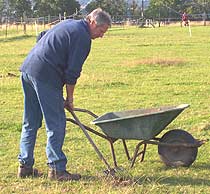
Horse and Pony Worming Myths
Over the years, as horse owners discuss their worming programs, myths have evolved - if believed and followed these can have a detrimental effect on your horse or pony's health.
Here we reveal the facts behind the most common myths and misconceptions regarding worming and how not to use equine wormers.
MYTH: You don't need to pick droppings from horse pasture if you worm regularly

Regularly removing horse
droppings from pasture is an
environmentally friendly method
of worm control
This is untrue.
Removing horse droppings from grazing land or "poo picking" is one of the most effective means of controlling the spread of worms, including redworms, amongst horses and ponies.
Horse droppings and manure contains eggs and larvae of parasites and worms that can pass onto the surrounding grazing and be eaten by all horses grazing in that field.
This is an environmentally friendly, non-chemical method of worm control that can help break the worm lifecycle and reduce dependence on medicinal wormers.
If you monitor worm counts you may find that you need to worm less often if you keep your paddocks clean
MYTH: "After worming a horse should be kept stabled for 24 hours"
There is no good reason to keep a horse stabled in his box for 24 hours after being wormed.
An equine wormer is designed to kill targetted parasites in a horse or pony's gut.
The Worms and worm larvae that are passed in the horse's droppings after worming are dead.
These dead worms and larvae cannot infect or cause a worm infestation in the horse, or infect the horse's pasture, paddock or grazing.
Keep to your horse's normal routine and turn him out if this is what he used to - a change in a horse's routine can cause colic.
MYTH: "It's OK to give the same worming dose to all horses on a yard"
This is definitely NOT OK! Although most popular equine wormers DO allow a wide margin of safety - if a horse is dosed with a little bit more than recommended there are normally no harmful side effects- others are not so safe
Some horse wormers can cause serious side effects if a horses or pony is given more than the recommended dose, especially if the horse is thin or in poor condition, and this can sometimes be fatal.
Dosing with more than is recommended by the manufacturers does not kill worms and worm larvae more effectively.
Administering a dose of wormer that is less than recommended for your horse's weight may not kill the targeted worms and larvae and it also increases the chance of worms becoming resistant to wormers.
MYTH: "Harrowing horse's paddocks will control worms"
Unfortunately, unless you live in a very hot dry country with conditions that dry out eggs and larvae, harrowing will not control worms but will in fact spread the eggs and larvae over a wider area.
Spreading the eggs and larvae makes it more likely that horses will ingest them as they graze and become infested with worms.
HORSE CARE ADVICE AND EQUESTRIAN ARTICLES
Ringbone Treatment | Hay Steamers | Laminitis | Feeding Hay | Feed Balancers |Feeding Linseed Horses | Causes of horse nosebleeds | Redworm | Equine Sweet Itch | Devils Claw For Horses | Equine kissing spines |Horse Colic | Removing Bot Fly Eggs | Feeding Haylage | Soaking Hay | Arnica for bruised soles | Rain Scald | Horse livery Wiltshire | Choosing horse insurance | Horse Feed Bedfordshire | Moody Mare Supplement | Windgalls | Windsucking | White Line Disease | Australian Noseband